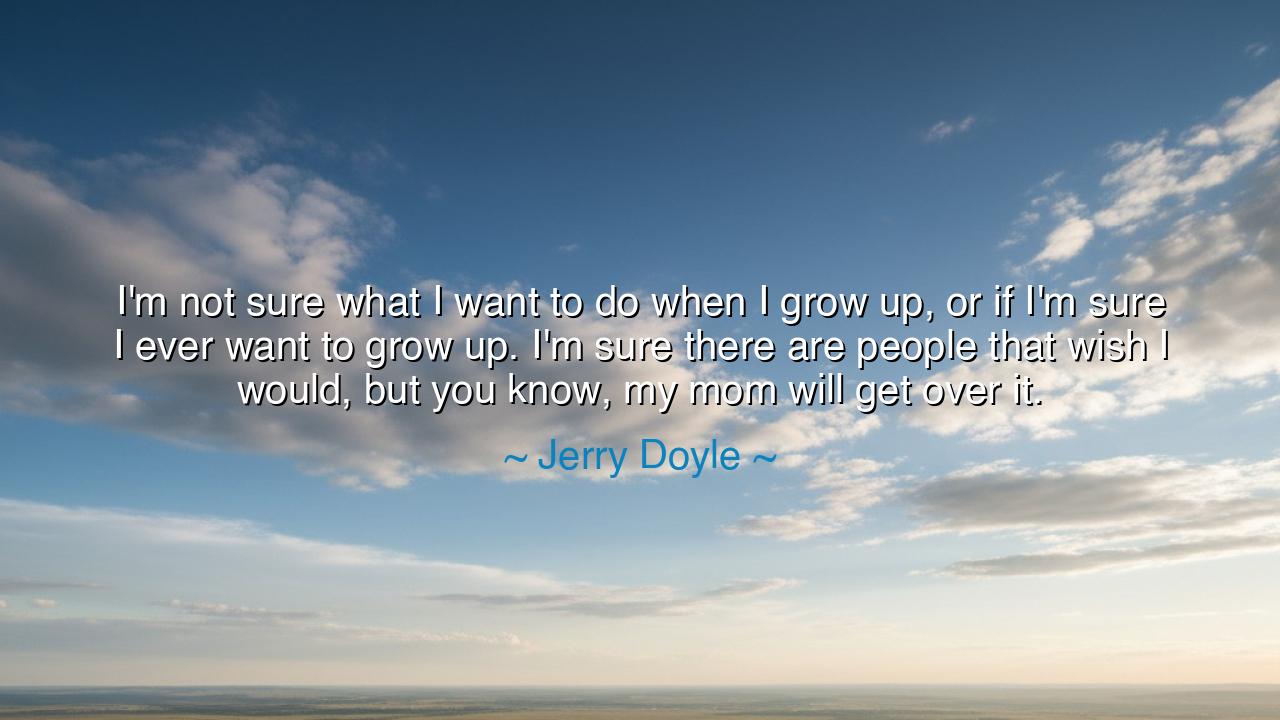
I'm not sure what I want to do when I grow up, or if I'm sure I
I'm not sure what I want to do when I grow up, or if I'm sure I ever want to grow up. I'm sure there are people that wish I would, but you know, my mom will get over it.






The words of Jerry Doyle, “I'm not sure what I want to do when I grow up, or if I'm sure I ever want to grow up. I'm sure there are people that wish I would, but you know, my mom will get over it,” are spoken with humor, yet within them lies a deep meditation on the nature of life, identity, and the tension between expectation and authenticity. At first glance, it sounds like a playful refusal to accept responsibility, but beneath the jest is an ancient truth: that to grow up is not merely about age, but about surrendering wonder, imagination, and freedom to the weight of convention. Doyle’s words remind us that one can grow older in body without surrendering the spirit of youth.
The origin of this thought is found in the eternal conflict between society’s demands and the individual’s longing to remain true to themselves. From childhood, we are told to prepare for the day when we must “grow up”—to find a career, settle into routine, and conform to what others believe is maturity. Yet Doyle resists this summons. He confesses uncertainty not only about what to do but whether he wishes to join this march into adulthood at all. In this resistance, there is not laziness, but a defense of freedom: the refusal to sacrifice joy and curiosity on the altar of expectation.
This defiance has echoes in the lives of many who shaped history. Consider Peter Pan, not the fictional boy alone but the symbol he became: the embodiment of the refusal to abandon youth’s spirit. Or look to Leonardo da Vinci, who even into old age approached the world with the eyes of a child—sketching, experimenting, asking questions others deemed foolish. He “never grew up” in the ordinary sense, and in this refusal, he uncovered wonders that still shape civilization. Doyle’s quip belongs to this lineage, for he too implies that the spirit of youth should not be surrendered simply because others wish it so.
Yet his words also carry a note of familial humor: “my mom will get over it.” This is both tender and defiant, for it acknowledges the weight of parental expectation while choosing one’s own path regardless. Every generation feels this pull: the desire to make parents proud, but also the yearning to live authentically. Doyle accepts that his mother may wish him to grow into a more conventional mold, yet he affirms that she, and others like her, will survive his refusal. This honesty is liberating—it is the courage to admit that we cannot live solely for others’ approval.
There is also sorrow hidden in his words: the sadness that so many people “wish I would” grow up. It reflects how society often pressures individuals to abandon their playfulness, their eccentricities, their sense of possibility. Those who resist are viewed as irresponsible or naïve. But Doyle’s wisdom is in seeing this as a loss: for to grow up in such a way is often to become narrow, weary, and hardened. To preserve the spirit of youth is not folly but strength—it is to carry joy and wonder into every season of life.
The lesson here is profound: do not confuse maturity with the death of youth. True growth is not about abandoning joy or curiosity, but about integrating them with responsibility. One can be wise and yet playful, grounded and yet imaginative, responsible and yet free. The greatest danger is not in refusing to grow up, but in surrendering too fully to the gray weight of conformity, forgetting the fire that first made us alive.
Practically, this means preserving space in life for play, for curiosity, for laughter. Take time to do things that awaken the child within you, even as you carry the burdens of adulthood. Do not judge yourself by the expectations of others—parents, peers, or society—but by the authenticity of your own journey. And if others, even those you love, wish you to “grow up” in ways that dim your spirit, remember Doyle’s words: they will get over it.
Thus, Jerry Doyle’s playful remark becomes a teaching for generations: to grow old is inevitable, but to grow up is optional. Hold fast to the heart of the child within you, for it is the wellspring of wonder, creativity, and joy. And in that refusal to fully “grow up,” you may find not only freedom, but the truest form of wisdom.






AAdministratorAdministrator
Welcome, honored guests. Please leave a comment, we will respond soon